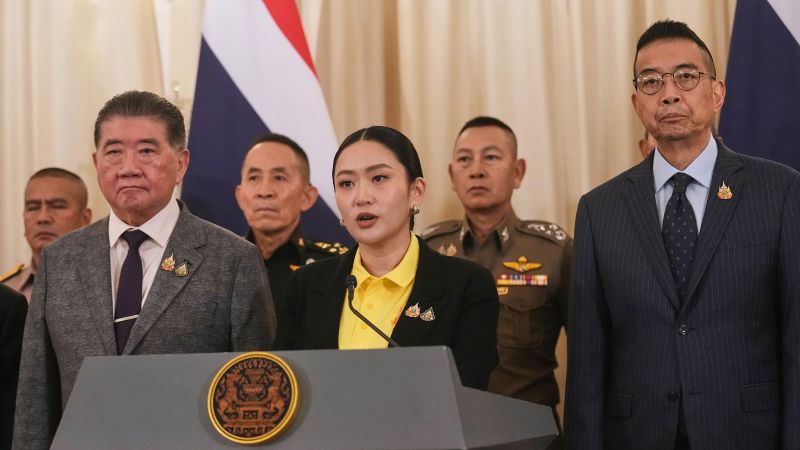
BANGKOK – Thailand’s Prime Minister Paetongtarn Shinawatra faces mounting pressure to resign following the leak of a 17-minute phone call with Cambodia’s former leader, Hun Sen. The call, which appeared to criticize the Thai military amid an escalating border dispute, has sparked widespread anger and uncertainty in a politically turbulent nation.
Immediate Impact
The leaked conversation has intensified scrutiny on Paetongtarn, who has been in office for just ten months. Her remarks have been interpreted as a sign of discord between her government and Thailand’s powerful military, further complicating the Southeast Asian kingdom’s efforts to stabilize its economy and manage foreign relations.
“Thailand views that these actions are unacceptable conduct between states. It contradicts internationally accepted practices and the spirit of good neighborliness,” a spokesperson from Thailand’s Ministry of Foreign Affairs stated.
Key Details Emerge
The call, which took place on June 15, revealed Paetongtarn referring to Hun Sen as “uncle” and criticizing her own military’s actions following a border clash that resulted in the death of a Cambodian soldier. The prime minister urged Hun Sen not to heed the “opposite side,” referencing a Thai army commander.
Hun Sen, who shared the recording with Cambodian officials, later posted the full audio online, exacerbating tensions. In response, Thailand summoned the Cambodian ambassador to protest the breach of diplomatic protocol.
Political Fallout
The fallout from the leak has been swift. The Bhumjaithai party, a significant coalition partner, has withdrawn its support, jeopardizing the stability of Paetongtarn’s government. Critics accuse her of compromising national interests, with calls for her resignation growing louder.
“Paetongtarn compromised her position as prime minister and damaged Thai national interest by kowtowing to Hun Sen,” said Thitinan Pongsudhirak, a political science professor at Chulalongkorn University.
Background Context
Thailand and Cambodia share a complex relationship marked by both cooperation and rivalry. The two nations have a long-standing border dispute, with recent clashes exacerbating tensions. The Emerald Triangle, where Thailand, Cambodia, and Laos converge, has been a flashpoint for military confrontations.
In 2011, a similar dispute over the Preah Vihear temple led to deadly skirmishes. Despite past efforts to de-escalate, both countries have reinforced troops along the border, with Thailand imposing restrictions on crossings and Cambodia retaliating with trade bans.
Regional Implications
The timing of the leak is significant as Thailand negotiates a trade deal with the United States. The scandal threatens to undermine these efforts, with potential repercussions for the region’s economic stability.
Meanwhile, Cambodia has sought international intervention, filing a request with the UN’s International Court of Justice over disputed areas. However, Thailand does not recognize the court’s jurisdiction, adding another layer of complexity to the diplomatic standoff.
Expert Analysis
Political analysts suggest that Paetongtarn’s position is increasingly untenable. The scandal has not only weakened her domestic support but also strained Thailand’s relations with a key neighbor.
“Her exit is a matter of time and she could be liable for further charges,” Thitinan Pongsudhirak warned.
What Comes Next
As the situation unfolds, both countries remain on high alert. The potential for further escalation looms, with nationalist sentiments running high on both sides of the border. Observers are closely watching for any diplomatic breakthroughs or further deterioration in relations.
For now, the Thai government faces the dual challenge of managing internal political fallout and navigating complex international dynamics. The outcome of this crisis will likely have lasting implications for the region’s geopolitical landscape.




